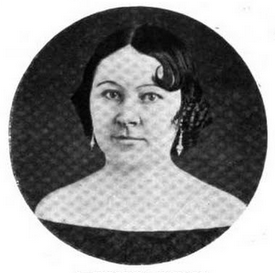
Samuel Daniel (1562–1619) was an English poet, playwright and historian in the late-Elizabethan and early-Jacobean eras. He was an innovator in a wide range of literary genres. His best-known works are the sonnet cycle Delia, the epic poem The Civil Wars Between the Houses of Lancaster and York, the dialogue in verse Musophilus, and the essay on English poetry A Defence of Rhyme. He was considered one of the preeminent authors of his time and his works had a significant influence on contemporary writers, including William Shakespeare. Daniel's writings continued to influence authors for centuries after his death, especially the Romantic poets Samuel Taylor Coleridge and William Wordsworth. C. S. Lewis called Daniel "the most interesting man of letters" whom the sixteenth century produced in England.

William Cullen Bryant was an American romantic poet, journalist, and long-time editor of the New York Evening Post. Born in Massachusetts, he started his career as a lawyer but showed an interest in poetry early in his life.

"Thanatopsis" is an early poem by the American poet William Cullen Bryant. Meaning 'a consideration of death', the word is derived from the Greek 'thanatos' (death) and 'opsis'.

Elizabeth Drew Stoddard was an American poet and novelist.

"Christ the Lord Is Risen Today" is a Christian hymn associated with Easter. Most of the stanzas were written by Charles Wesley, and the hymn appeared under the title "Hymn for Easter Day" in Hymns and Sacred Poems by Charles and John Wesley in 1739. The hymn eventually became well known for the "Alleluia" sung as a melisma after each line, which was added by an unknown author, probably to fit the commonly used hymn tune, "Easter Hymn". It remains a traditional processional hymn on Easter Sunday.
The Fellowship of Southern Writers is an American literary organization that celebrates the creative vitality of Southern writing as the mirror of a distinctive and cherished regional culture. Its fellowships and awards draw attention to outstanding literary achievement and help to nurture new talent.

The William Cullen Bryant Homestead is the boyhood home and later summer residence of William Cullen Bryant (1794–1878), one of America's foremost poets and newspaper editors. The 155-acre (63 ha) estate is located at 205 Bryant Road in Cummington, Massachusetts, overlooks the Westfield River Valley and is currently operated by the non-profit Trustees of Reservations. It is open to the public on weekends in summer and early fall for tours with an admission fee.
A periodic sentence is a sentence with a stylistic device featuring syntactical subordination to a single main idea, which usually is not complete until the very end of the sentence. The periodic sentence emphasizes its main idea by placing it at the end, following all the subordinate clauses and other modifiers that support the principal idea. According to Merriam-Webster, the linguistic sense of the periodic sentence term was coined circa 1928, but there is evidence of its usage in a separate sense dating from 1766.
Nationality words link to articles with information on the nation's poetry or literature.
— words chiselled onto the tombstone of John Keats, at his request
Nationality words link to articles with information on the nation's poetry or literature.
Nationality words link to articles with information on the nation's poetry or literature.
Nationality words link to articles with information on the nation's poetry or literature.
Nationality words link to articles with information on the nation's poetry or literature.
Nationality words link to articles with information on the nation's poetry or literature.
Nationality words link to articles with information on the nation's poetry or literature.
Nationality words link to articles with information on the nation's poetry or literature.

Lucy Virginia French was a 19th-century American author and poet from Virginia. Her blank verse was considered especially strong, and her themes were well chosen, mostly in their measure. she belonged to a cultured and wealthy family. Educated at Washington, Pennsylvania, she moved to Memphis, Tennessee, where she lived until her marriage in 1853, to John Hopkins French, living after this at "Forest Home," near McMinnville, Tennessee. Her first volume of poems, "Wind Whispers," appeared in 1856. She wrote "Tecumseh's Foot," "The Great River," "The Lyre of Time," "The Palmetto and the Pine," "The Years," "Mammy," "Liberty Bells," and other poems, besides several novels and dramas. She took a keen interest in the political questions of the day and wrote about them. Her first novel, "My Roses," appeared in 1872, and her last one, "Darlingtonia," in 1879. Between the years 1856 and 1879, she was actively engaged as literary editor of a number of magazines and newspapers. She wrote under the name L'Inconnue. Among her friends were James Russell Lowell, Henry Wadsworth Longfellow, Oliver Wendell Holmes Sr., John Greenleaf Whittier, and William Cullen Bryant.

The Poets and Poetry of America was a popular anthology of American poetry collected by American literary critic and editor Rufus Wilmot Griswold. It was first published in 1842 and went into several editions throughout the 19th century.

Bishop Singleton T. Jones was a religious leader in the African Methodist Episcopal Zion Church. Although he had little education, Jones taught himself to be an articulate orator and was awarded the position of bishop within the church. Besides being a pastor to churches, he also edited AME Zion publications, the Zion's Standard and Weekly Review and the Discipline.









